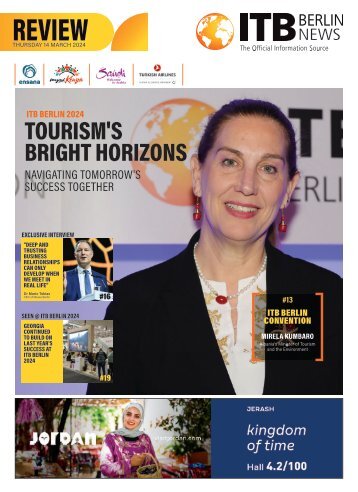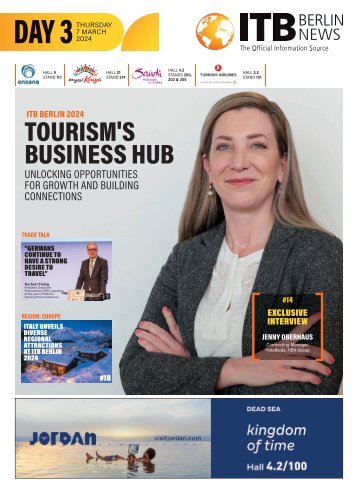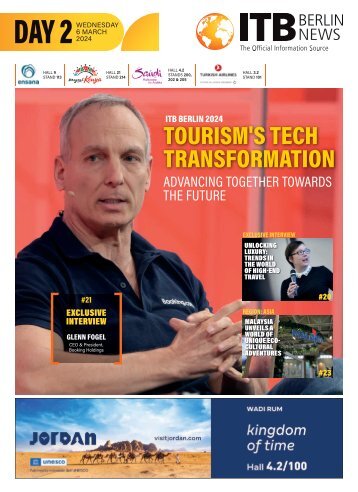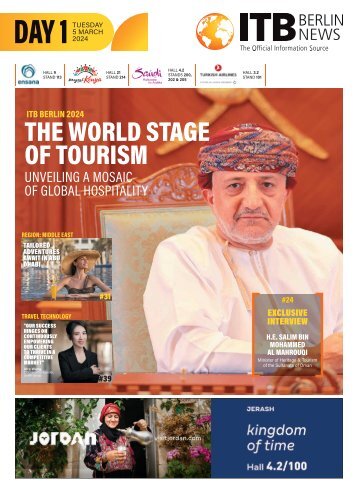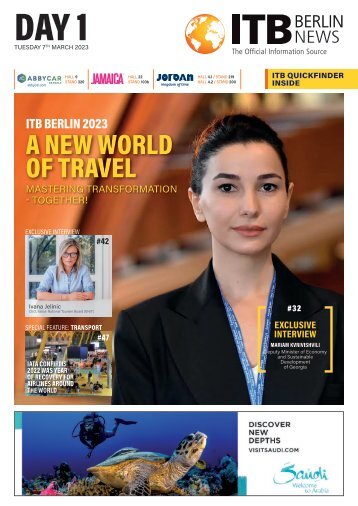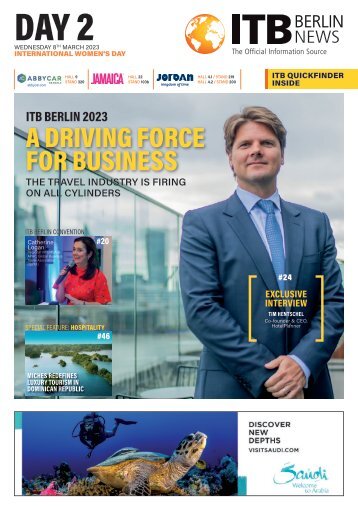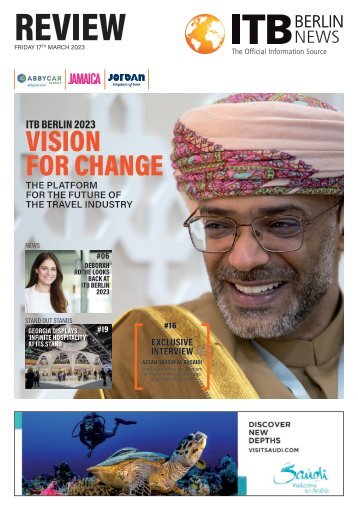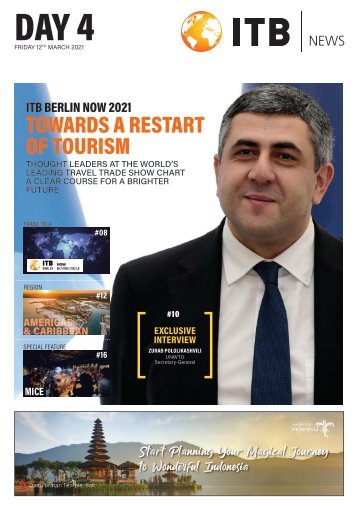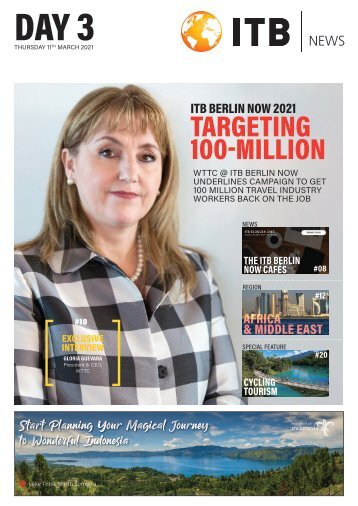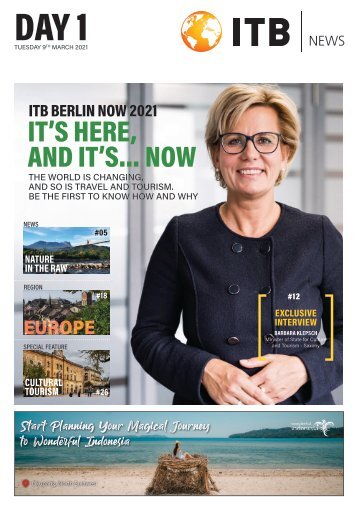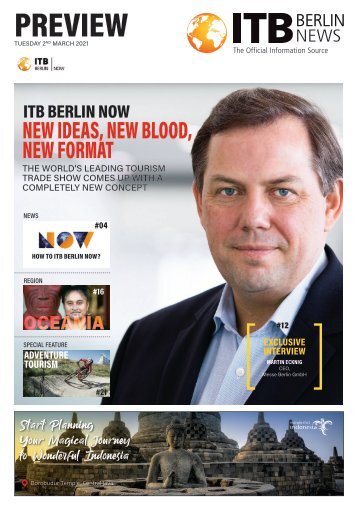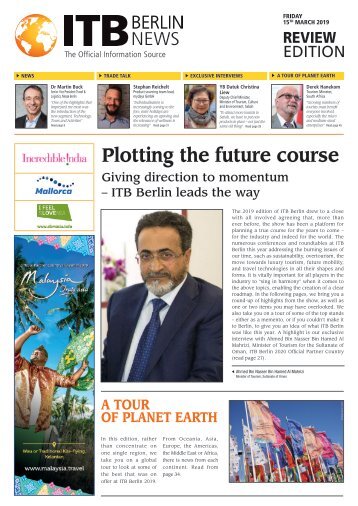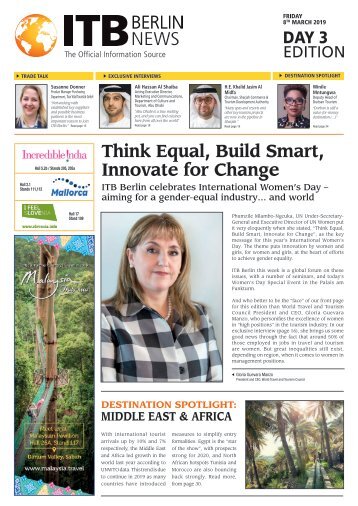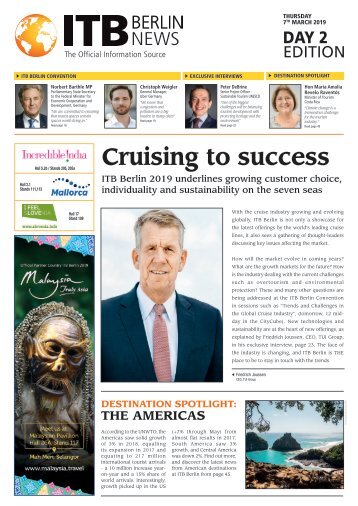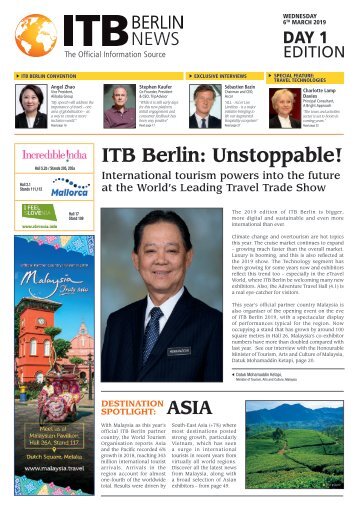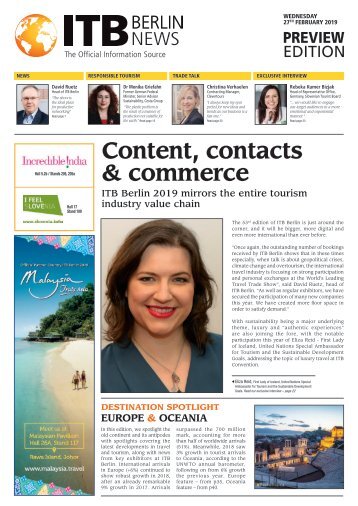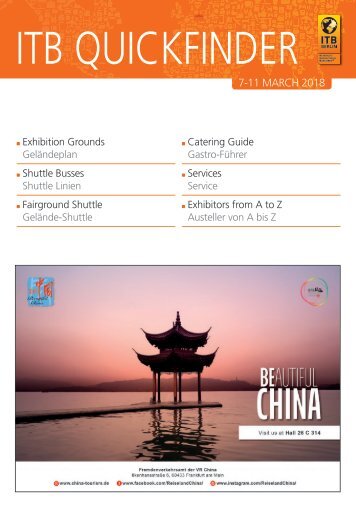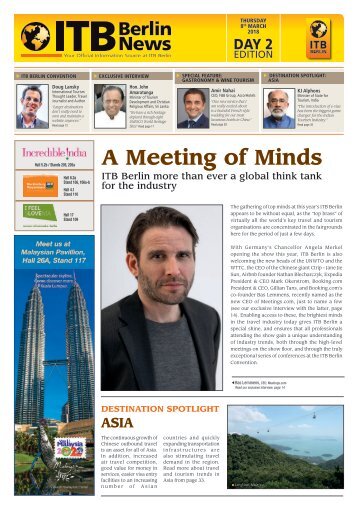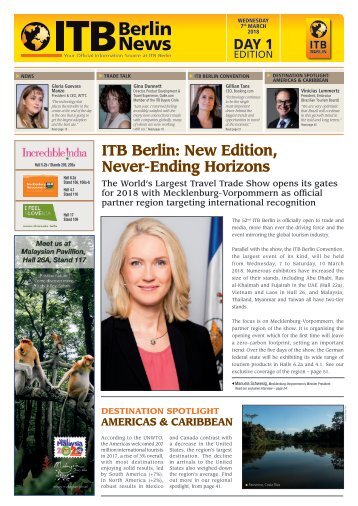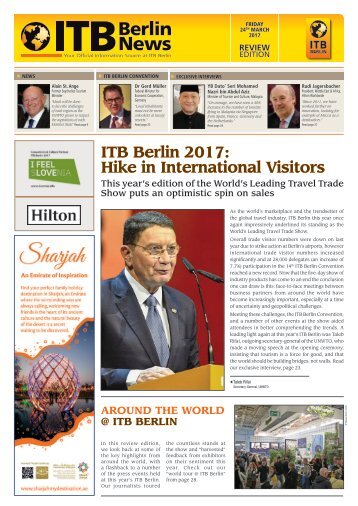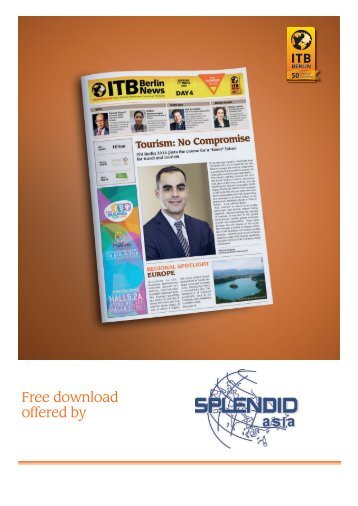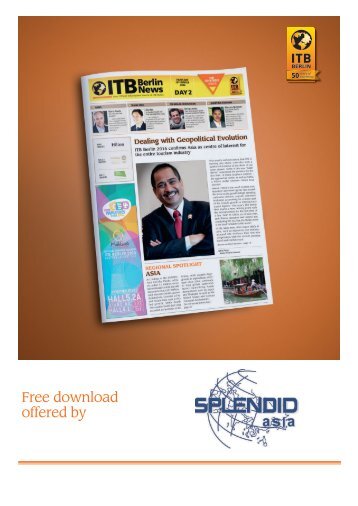
ITB Berlin News 2020 #3
- Text
- Tourism
- Berlin
- Luxury
- Hotels
- Selangor
- Destinations
- Destination
- Region
- Malaysia
- Experiences
- Www.cleverdis.com
I ITB BERLIN CONVENTION
I ITB BERLIN CONVENTION ICities getsmartFormer UNWTO senior officer andcurrent advisor to the SecretaryGeneral of the World Tourism CitiesFoundation, Esencan Terzibasogluwas set to participate in animportant presentation at the ITBBerlin Convention, entitled, “BetterCity Life Through Smart Tourism”.We asked Ms Terzibasoglu to tell usa little more about what was to becovered at the session.The World Tourism Cities Federation (WTCF)has recently released the “Global Report onSmart Tourism in Cities” sharing the resultsof a comprehensive research on smarttourism in urban destinations. The conceptof “smart tourism” is closely related to theconcept of “smart city”. “Smart tourism” hasgained significant momentum in destinationgovernance policies and managementstrategies over more than a decade becausethe tourism industry has been facing atremendous paradigm shift as regardsthe behaviour of the traveller as well as thestructure of the supply chain.What are the keys to becominga “smart urban tourismdestination”?Context wise, one can saythat “smart cities” are thosewhich have developed smart(intelligent) physical, social,institutional and economicinfrastructure while ensuringthe centrality of citizens in asustainable environment. Wecan also say that “smart urbandestinations” are those whichshow the above-mentionedcharacteristics and likewise,which have also developedefficient strategies to enhancetourism competitiveness by deployingtheir natural and cultural resources in asustainable manner and by creating innovativeproducts for the visitor. Within this context,it is significant that smart urban destinationsshould take the advantage of the fast changingdigital technology, smart devices and in themeantime create strategic information andknowledge by using smart tools and platformsand share all this with the stakeholders forbetter governance and managementEsencanTerzibasoglu12 • ITB BERLIN NEWS • THURSDAY 19 TH MARCH 2020www.itb-berlin-news.com
I ITB BERLIN CONVENTION IPOLICY MAKERS NEED TOWORK WITH INDUSTRY ANDCOMMUNITIES TO (…) IMPLEMENTA LONG-TERM AND SUSTAINABLEVISION FOR THE FUTUREAlain DupeyrasHead of Regional Developmentand Tourism Division, OECDTourism trends and policies 2020OECD releases important new industry reportsA keynote panel at ITB was set to tackle “Re-thinking TourismSuccess: Managing Destinations for Sustainable Growth”,with the release of a new OECD report entitled "TourismTrends and Policies 2020" .In the absence of the keynote, we asked Alain Dupeyras,Head of Regional Development and Tourism Division, OECDto give us some details about the report.The 2020 edition of OECD TourismTrends and Policies 2020 analysestourism performance and policytrends across 51 OECD countries andpartner economies. It highlights theneed for coherent and comprehensiveapproaches to tourism policymaking, and the significance of thetourism economy, with data coveringdomestic, inbound and outboundtourism, enterprises and employment,and internal tourism consumption.The chapter on “Rethinking tourismsuccess for sustainable growth”explores the economic, social andenvironmental benefits and costsassociated with tourism growth,and the need for policy makers andindustry to better understand thepotential implications for destinationsstriving to achieve more sustainabletourism growth. The analysishighlights that for many countries,regions and destinations, tourismgrowth remains economically, sociallyand environmentally unbalanced,often as a result of rapid andunplanned growth in visitor numbers.A selection of key policyconsiderations are highlighted to helpboth established and new destinationsto strike a balance between thebenefits and costs associated withtourism development and implementa sustainable vision for the future.For many destinations, tourismremains unbalanced, and as a result,policy makers need to work withindustry and communities to strikea balance between the benefitsand costs associated with tourismdevelopment and implement a longtermand sustainable vision for thefuture.Do you have any examples of bestpractices?The report is a rich source of countryexamples and best practices. In termsof sustainability, the examples beloware some of the most recent andinnovative initiatives introduced inOECD countries:• Mainstreaming sustainability.Built upon extensive stakeholderconsultation, Plan T – Master Plan forTourism defines sustainability in allits facets as the overarching guidingprinciple for tourism in Austria. WhilePerspective 2030 provides a newvision of Destination Holland with theambition that by 2030, every Dutchcitizen will benefit from tourism. Inorder to build a loved, valuable andliveable destination.• Engaging the industry. TheTourism Sustainability Commitmentinitiative in New Zealand is an industryled initiative established by TourismIndustry Aotearoa, which aims toensure that every New Zealandtourism business is committedto sustainability by 2025 (www.sustainabletourism.nz). Developed byindustry for industry, it has established8 industry-level sustainability Goalsand 14 Commitments.• Designing new tourism strategies.Under Canada’s new tourism strategy,Creating Middle Class Jobs: A FederalTourism Growth Strategy, two of thethree main pillars have a specific focuson investment to support sustainablegrowth, with one of the key objectivesbeing to grow international visitationoutside of gateway cities and thecountry’s most iconic tourismdestinations, and beyond the summerseasonTHE OECD WORKSTO DELIVERBENEFITS TOPEOPLE, PLACESAND BUSINESSESTHROUGHTOURISMWhile overall growth trendsin this dynamic sector arepositive – despite potentialshort-term impacts due to anuncertain economic outlookand external shocks (such ashealth scares and extremeweather events) – governmentsare increasingly developingpolicies that seek to maximisethe economic, environmentaland social benefits that tourismcan provide.Governments are currentlyfacing two critical issuesin terms of managing thetourism sector: leveragingthe benefits of the digitaltransformation, and the need toimplement sustainable tourismpolicies. Both of these topicsare addressed as thematicchapters in the current OECDflagship publications, TourismTrends and Policies 2020, andRethinking tourism success forsustainable growthITB BERLIN NEWS • THURSDAY 19 TH MARCH 2020 • 13
- Page 1: 03ITB BERLIN:WHEN QUALITYCOUNTS…A
- Page 5: I NEWS ITOUR PARTNERGROUPPRESENTSID
- Page 8 and 9: 8 • ITB BERLIN NEWS • THURSDAY
- Page 11: I NEWS IADVERTORIALNew brandambassa
- Page 15: I RESPONSIBLE TOURISM IGames people
- Page 18 and 19: I SPECIAL FEATURE I LUXURY ACCOMMOD
- Page 21 and 22: ADVERTORIALI SPECIAL FEATURE I LUXU
- Page 23 and 24: I SPECIAL FEATURE I LUXURY ACCOMMOD
- Page 25 and 26: ADVERTORIALI SPECIAL FEATURE I CITY
- Page 27: I SPECIAL FEATURE I CITY BREAKS IAD
- Page 31 and 32: ADVERTORIALI REGION I ASIA IHard to
- Page 33: I REGION I ASIA INew luxury vessel
- Page 36 and 37: I REGION I ASIA ITransforming Singa
- Page 38: I SPOTLIGHT ON GERMAN REGION I BAVA
Inappropriate
Loading...
Mail this publication
Loading...
Embed
Loading...
